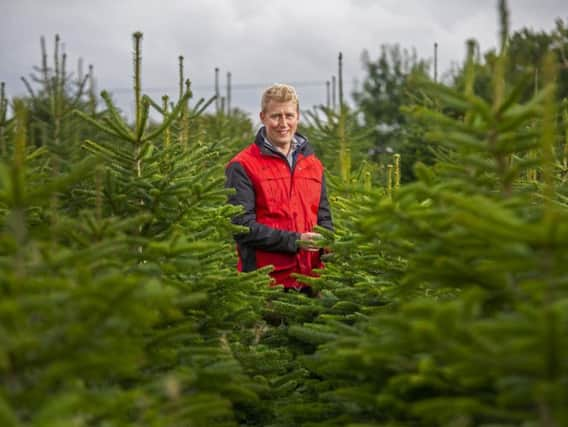Why Yorkshire's Christmas tree growers are looking to see their sales increase after Brexit


However, the estate manager at Yorkshire’s largest Christmas tree grower, Stockeld Park near Wetherby, says it’s one of a number of overseas enquiries he’s received this year due to the ‘Brexit effect’.You would think Sweden, with its huge forestry industries, wouldn’t dream of looking to the UK for a Nordmann Fir. But Grant believes the UK has suddenly become an attractive option for all potential overseas customers.“I’ve also had enquiries from The Hague and Puerto Rico,” he adds.The cost of shipping is a sticking point, which is why he believes these enquiries haven’t converted into orders. However, he expects Brexit to boost Christmas trees sales regionally this year.“I expect that people importing trees from Ireland and the continent will look to buy local this year,” he says.The estate, which grows half a million trees across 250 acres of land, supplies high profile customers including Covent Garden, Bettys tearooms and Emmerdale.This year it also provided the tree for Robbie Williams’ new Christmas video.It also sells wholesale across the UK as well as to retailers and hotels.Grant’s father started the Christmas tree business 30 years ago as a way of diversifying the estate.Grant’s team plants 60,000 trees a year but sells 30,000-35,000, leaving plenty of room for growth. It employs four full time Christmas tree growers. Staff numbers rise to 20 during harvesting and a further 10 when it comes to selling.Stockeld’s adventure park, which attracts around 200,000 visitors a year to its snowflake maze, an enchanted forest and an ice skating rink at Christmas, was launched in 2007 as a way of selling more trees.“It’s been hugely successful but not in the way we thought,” says Grant. “We don’t sell more Christmas trees because now the whole family comes in the car and there isn’t room for a tree.”This year Stockeld has launched a home delivery service to get around this issue. Customers across the North and down to the West Midlands can choose their tree in person and then opt to have it delivered on a certain date.Grant says: “We’re definitely looking to grow. There is a market for real Christmas trees and it has a positive environmental impact. Our Christmas tree operation generates enough oxygen to sustain 4,000 people. You can’t say that about plastic trees.”According to the British Christmas Tree Growers Association, an estimated six-eight million real Christmas trees are sold in the UK each year.The tree growing business appears to be growing in popularity among large estate owners who are looking to diversify their income.Mexborough Estates has grown Christmas trees on land in Hawnby, North Yorkshire, for 19 years and in Methley, West Yorkshire, for 12 years.Jamie Savile, managing trustee, oversees the growing of about 5,000 trees in Methley and thousands more in Hawnby. They are sold over the festive period in his pop-up retail shop in Methley.Visitors can either pick and chop down their own trees or buy a ready-netted tree.“It’s grown gradually and I’m keen to continue expanding it because it’s been a real success,” says Savile.Meanwhile, Stephen Wombell, owner of Newburgh Priory in Coxwold, North Yorkshire, has been growing Christmas trees on his estate for the last eight years. This year he’s almost ready to sell them in bulk for the first time.He and his childhood friend and business partner, Will Standeven, decided to start growing Christmas trees to diversify the estate’s income shortly after he took over the running of the priory from his father who retired in 2010.Wombwell hopes that in a few years’ time, up to 25 per cent of his income will come from selling trees, but at the moment it’s a waiting game. “The bank balance is not good. We’ve had seven years of growing trees with roughly £100,000 worth of outgoings a year,” he says.The first Christmas tree seedlings were planted in the ground in 2012 and Newburgh is fast becoming one of Yorkshire’s biggest Christmas tree growers with 220,000 across 110 acres.So far, the pair have only sold trees via their own pop-up Christmas shop in the house. However, this is the year they plan to start selling wholesale.“We can do it on a slightly smaller scale this year and practice all the things that are going to get bigger in years to come,” says Wombwell.All of the wholesale trees will be sold through Infinity Christmas Trees – a consortium they set up 18 months ago with a handful of other growers from across the UK.The aim is to sell quality trees that are locally sourced into the local area to reduce the environmental impact of Christmas tree distribution.“No tree should be really doing more than 50 or 60 miles,” says Wombwell.The operation at Newburgh employs a couple of people but it can increase to up to 12 people when they plant up to 35,000 trees in the spring.The number of jobs, particularly seasonal jobs, will increase further as the operation expands.The fact that all this is happening below the body of the man who banned the Christmas, adds to the fun, he says.Oliver Cromwell’s remains are said to be in the rafters at Newburgh.Cromwell’s daughter, Mary, married Newburgh’s Lord Fauconberg and is said to have paid a bribe for her father’s headless corpse to be stolen from the walls of the Tower of London.A vengeful Charles II had Cromwell’s body dug up, beheaded and displayed when he returned from France.The head is now in Sydney Sussex College, Cambridge. The remains were taken to Newburgh.“He came in a bit by accident into the family history,” says Wombwell, 42. “But it’s actually rather fun selling Christmas trees almost from under his nose...if he had a nose here.”